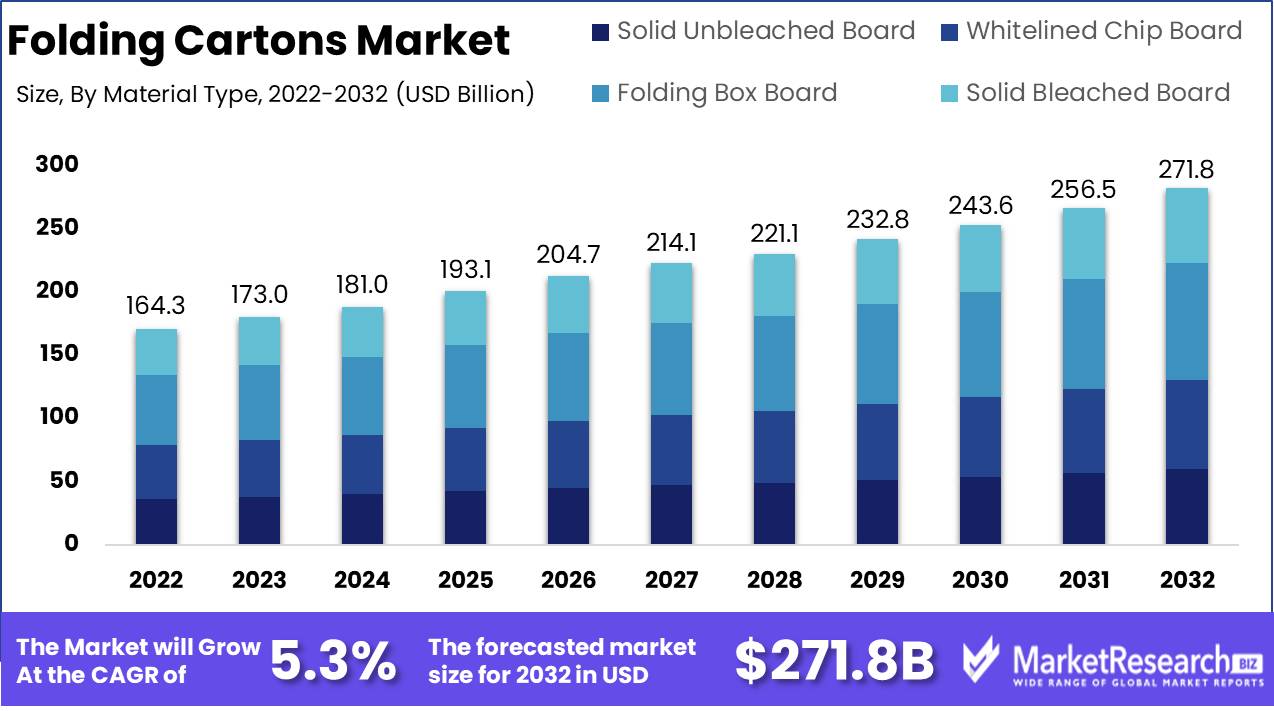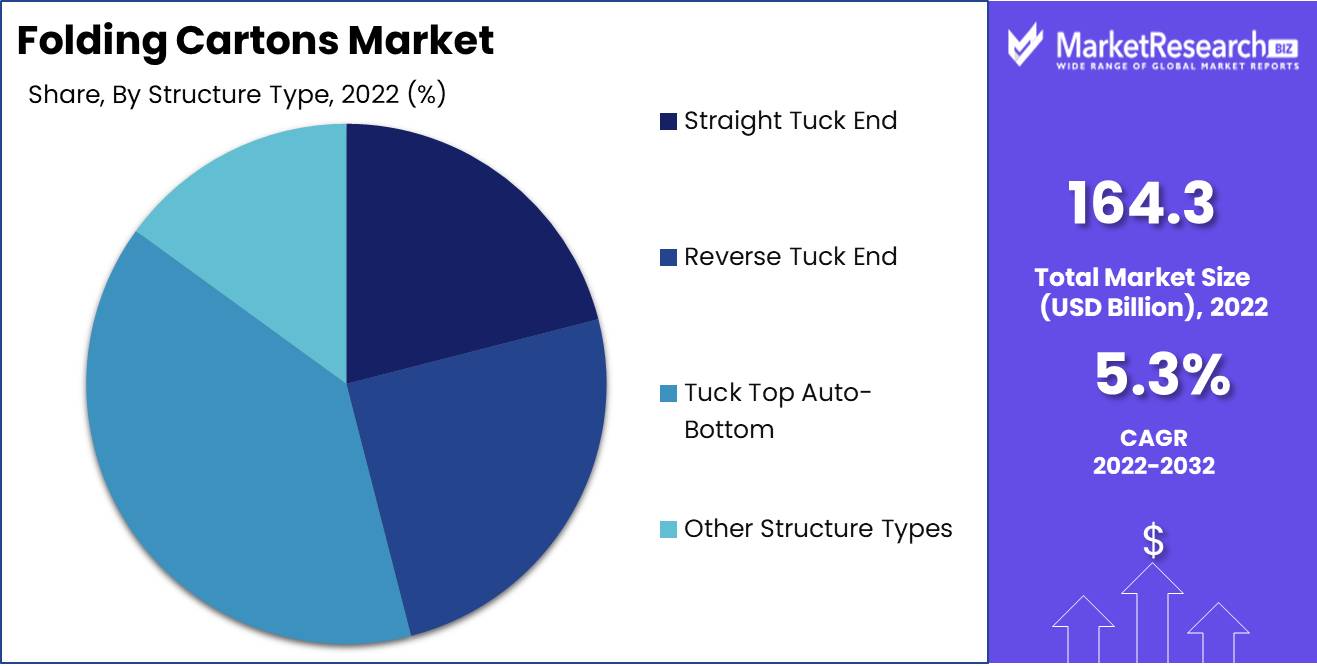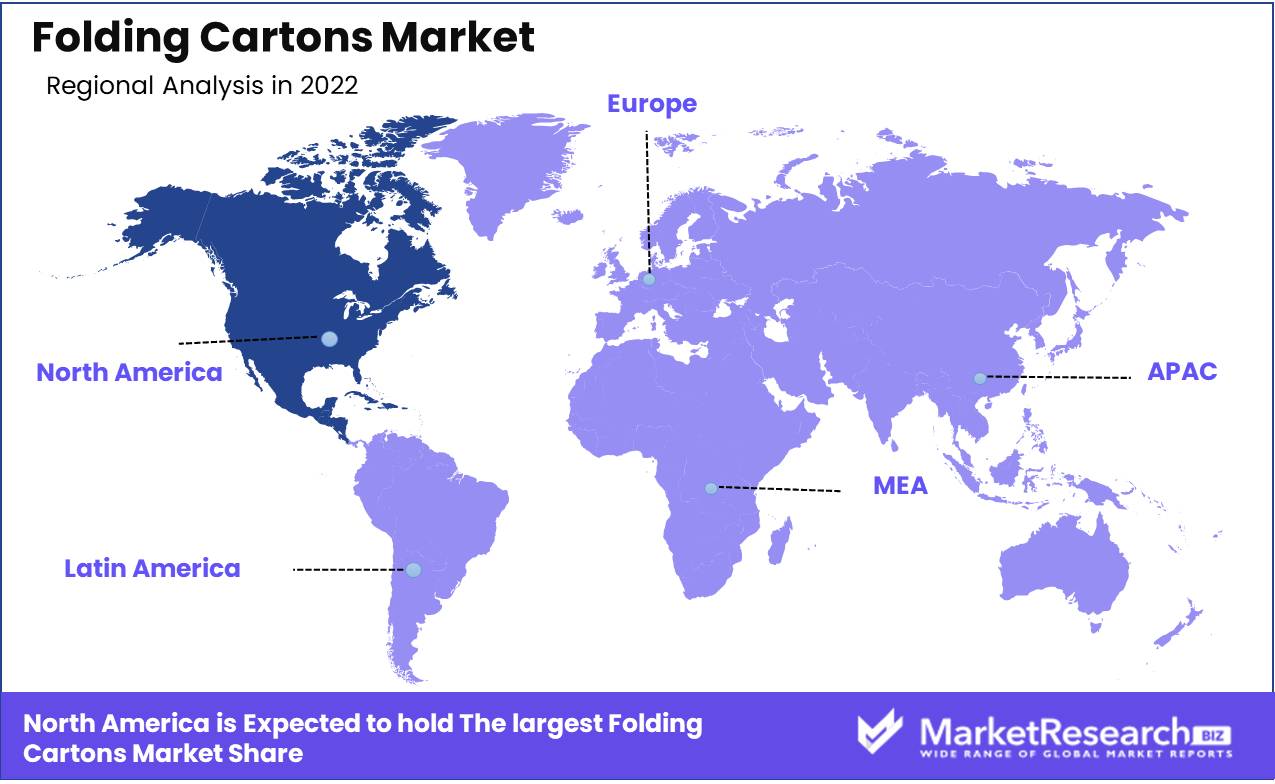
Folding Cartons Market By Material Type (Solid Unbleached Board, Whitelined Chip Board, Folding Box Board), By Structure Type (Straight Tuck End, Reverse Tuck End, Tuck Top Auto-Bottom, Other Structure Types), By End-Use Industry (Food & Beverages, Pharmaceutical, Other), By Region And Companies - Industry Segment Outlook, Market Assessment, Competition Scenario, Trends, And Forecast 2023-2032
-
7789
-
May 2023
-
176
-
-
This report was compiled by Correspondence Linkedin | Detailed Market research Methodology Our methodology involves a mix of primary research, including interviews with leading mental health experts, and secondary research from reputable medical journals and databases. View Detailed Methodology Page
-
Report Overview
Folding Cartons Market size is expected to be worth around USD 271.8 Bn by 2032 from USD 164.3 Bn in 2022, growing at a CAGR of 5.3% during the forecast period from 2023 to 2032.
In recent years, there has been a notable surge in the folding cartons market, primarily attributed to the increasing need for packaging alternatives that possess attributes of adaptability and environmental consciousness. Folding cartons are paper containers that possess the convenient ability to be easily collapsed and assembled. The utilization of packaging materials is prevalent across diverse industries, encompassing the containment of food, beverages, pharmaceuticals, cosmetics, and various other commodities. The main aim of folding cartons is to offer a packaging solution that is both cost-effective and environmentally sustainable, while also guaranteeing product safety and enhancing brand recognition.

The importance of folding cartons in the packaging industry cannot be overstated. They provide a multitude of benefits in comparison to alternative packaging materials, such as plastic and glass. To begin with, folding cartons possess the advantageous characteristics of being lightweight and easily transportable, thereby resulting in reduced transportation expenses and diminished emissions of greenhouse gases. Furthermore, these packaging solutions offer a high degree of customization, enabling brands to develop distinctive and visually appealing designs that have the potential to captivate consumers. Furthermore, folding cartons possess the advantageous capability of being easily imprinted with essential product information, branding components, and visually appealing graphics. This attribute significantly enhances the efficacy of product marketing strategies and fosters brand recognition.
Significant advancements have been observed in the realm of folding cartons, leading to the expansion of conventional packaging solutions. For example, certain companies have successfully engineered folding cartons that incorporate advanced technologies, including RFID identifiers or QR codes. These technological advancements facilitate the ability of brands to effectively monitor and verify the authenticity of their products at every stage of the supply chain, thereby enhancing security measures and reinforcing the credibility of the brand. Furthermore, significant progress has been made in the utilization of biodegradable and compostable materials for the manufacturing of folding cartons, thereby fostering ecological sustainability and mitigating waste generation.
Considerable capital has been allocated to the folding carton market in response to the growing need for environmentally friendly packaging alternatives. The integration of folding cartons into packaging companies' product portfolios has facilitated the provision of a wider array of choices to clients, thereby catering to their unique packaging needs. Furthermore, substantial investments have been allocated towards enhancing production capacities and advancing manufacturing processes pertaining to folding cartons.
The proliferation of the folding carton market can be attributed to its extensive utilization across diverse industries. Folding cartons are commonly invested in by various industries, including food and beverage, pharmaceutical, personal care, consumer electronics, and other sectors. These industries necessitate packaging solutions that not only ensure the protection of their products but also adhere to regulatory and consumer standards. Folding cartons possess the necessary attributes of flexibility, durability, and branding potential to effectively address these requirements.
Driving factors
Packaged Consumer Goods
The folding cartons market has witnessed a significant increase in demand due to the growing need for packaged consumer goods. With the rise in consumerism and changing lifestyles, the demand for convenience-oriented products packaged in folding cartons has soared over the past few years. These cartons provide an efficient and cost-effective solution for storing and transporting goods, making them a preferred choice for numerous industries. Consumer goods, including food and beverage products, household products, personal care items, pharmaceuticals, and many others, rely on folding cartons for their packaging needs.
E-commerce and Retail Industries
The rapid growth of the e-commerce and retail industries has also fueled the demand for folding cartons. As more consumers opt for online shopping, the need for secure and visually appealing packaging has become paramount. E-commerce platforms and retailers alike understand the importance of packaging in attracting customers and ensuring product integrity during transit. Folding cartons offer numerous advantages for both e-commerce and retail businesses. They can be easily customized to showcase branding elements and product information, enhancing the overall customer experience.
Printing and Packaging Technologies
Advancements in printing and packaging technologies have revolutionized the folding cartons market. With the introduction of high-quality printing methods and advanced machinery, manufacturers can now produce folding cartons with intricate designs and vibrant colors. These technological advancements have opened up new opportunities for customization and branding in the packaging industry. Digital printing packaging, for instance, allows for shorter print runs and enables on-demand printing, reducing production costs and wastage. This flexibility benefits businesses, especially small and medium-sized enterprises, as they can now have personalized folding cartons without the need for large-scale production.
Sustainable and Recyclable Packaging
The expanding focus on sustainable and recyclable packaging has become a driving factor for the growth of the folding cartons market. Consumers are becoming more conscious of the environmental impact of packaging materials and are actively seeking eco-friendly alternatives. Folding cartons offer a sustainable solution as they can be made from recyclable materials such as paperboard. These cartons can be recycled and used for future packaging, reducing waste and contributing to a circular economy.
Efficient Product Protection and Branding
With the competitive nature of the market, product protection and branding have become essential for businesses across various industries. The folding cartons market meets this rising need by offering packaging solutions that ensure product integrity and enhance brand recognition. Folding cartons provide excellent protection against external factors such as moisture, light, and physical damage. This ensures that the packaged products reach consumers in pristine condition, maintaining their quality and freshness. Branding is another crucial aspect that folding cartons cater to.
Restraining Factors
Flexible and alternative packaging formats
The folding cartons market has been witnessing potential competition from flexible and alternative packaging formats, presenting a challenge for businesses operating in this industry. As consumer preferences and demands evolve, it is crucial for companies to remain aware of the changing market dynamics. There has been a growing trend towards flexible packaging solutions, such as pouches, bags, and sachets. These formats offer advantages such as convenience, lightweight, and easy portability.
Pricing and cost considerations
Another restraining factor in the folding cartons market is potential pricing and cost considerations. While folding cartons offer various benefits, including versatility and branding opportunities, businesses must carefully balance these advantages with the associated costs. Compared to some alternative packaging formats, folding cartons can be perceived as more expensive. The manufacturing process, materials used, and intricate designs can contribute to higher production costs.
Complex design and customization
Complex design and customization requirements present another potential challenge in the folding cartons market. Customers often demand unique and visually appealing packaging solutions that can differentiate their products in the market. However, accommodating these requirements can be a complex process. Creating intricate designs, incorporating special finishing techniques, and ensuring precise customizations can require additional time, resources, and expertise. This complexity can sometimes lead to delays in order fulfillment, which may impact customers' satisfaction and overall experience.
Economic fluctuations on consumer spending
The potential impact of economic fluctuations on consumer spending is a restraining factor that businesses in the folding cartons market need to consider. Economic downturns or recessions can lead to reduced consumer spending, affecting the demand for various products, including packaging solutions like folding cartons. During challenging economic times, consumers may prioritize essential purchases over non-essential items. This shift in spending behavior can directly impact industries dependent on discretionary spending, such as retail and consumer goods.
Material Type Analysis
The folding cartons market is dominated by the Folding Box Board Segment. This segment has emerged as the preferred material type for folding cartons due to its various advantages. Folding Box Board, also known as FBB, is a type of paperboard that is lightweight yet strong, making it ideal for packaging applications. The use of FBB in folding cartons ensures that the packaging is durable and can withstand the rigors of transportation and handling.
Consumer trends and behavior also play a significant role in the dominance of the Folding Box Board Segment. Consumers today are increasingly conscious about the impact of their purchasing decisions on the environment. They are gravitating towards sustainable and eco-friendly packaging solutions. Folding cartons made from FBB align with this consumer preference as they are recyclable and made from renewable resources. The Folding Box Board Segment has gained popularity among consumers who are looking for packaging options that are both aesthetically pleasing and environmentally friendly.
Structure Type Analysis
The Tuck Top Auto-Bottom Segment dominates the folding cartons market. This structure type has become the preferred choice for packaging applications due to its superior functionality and convenience. Tuck Top Auto-Bottom folding cartons offer easy assembly and quick closure, making them highly efficient for both manufacturers and end consumers.
Consumer trends and behavior also contribute to the dominance of the Tuck Top Auto-Bottom Segment. Today's consumers seek convenience and ease of use in packaging solutions. Tuck Top Auto-Bottom folding cartons provide a hassle-free experience for consumers, allowing them to easily open, access, and reseal their products. The convenience offered by this structure type aligns with consumer preferences and contributes to its popularity in the folding cartons market.

End-Use Industry Analysis
The Food & Beverages Segment dominates the folding cartons market. This segment has a significant presence due to the high demand for packaging solutions in the food and beverages industry. Folding cartons are widely utilized for packaging various food and beverage products, including snacks, beverages, confectionery items, and more.
Consumer trends and behavior also contribute to the dominance of the Food & Beverages Segment in the folding cartons market. Consumers today seek convenience, safety, and sustainability in their food and beverage packaging. Folding cartons provide a reliable and eco-friendly packaging solution that meets these consumer demands. The Food & Beverages Segment has gained popularity among consumers who prioritize the protection and freshness of their food and beverage products.
Key Market Segments
By Material Type
- Solid Unbleached Board
- Whitelined Chip Board
- Folding Box Board
- Solid Bleached Board
By Structure Type
- Straight Tuck End
- Reverse Tuck End
- Tuck Top Auto-Bottom
- Other Structure Types
By End-Use Industry
- Food & Beverages
- Pharmaceutical
- Electrical & electronics
- Personal Care & Cosmetics
- Other End-Use Industries
Growth Opportunity
Brand Owners and Packaging Converters
In order to excel in the highly competitive folding cartons market, forging strong partnerships with brand owners and packaging converters is crucial. By working closely with these stakeholders, carton producers can gain valuable insights into their specific branding needs, product requirements, and consumer preferences. Collaborative efforts enable companies to design and create folding carton solutions that align seamlessly with the brand image, effectively communicate brand values, and enhance the overall consumer experience. Folding cartons offer a versatile canvas for brand owners to showcase their products and connect with their target audience.
Digital Printing and Customization Capabilities
The advent of digital printing technology revolutionized the folding cartons market by unlocking new opportunities for customization and personalization. Digital printing offers unparalleled flexibility, enabling carton producers to cater to the growing consumer demands for unique and personalized packaging solutions. Integrating digital printing capabilities allows manufacturers to offer short-run and on-demand printing services, reducing lead times and minimizing inventory costs. This enables brand owners to respond swiftly to changing market trends and consumer preferences, enhancing their competitiveness in the market.
Supply Chain Optimization
A streamlined and optimized supply chain is the backbone of a successful folding cartons business. By adopting efficient supply chain practices and implementing just-in-time manufacturing principles, companies can significantly reduce costs, enhance operational efficiency, and improve customer satisfaction. Optimizing the supply chain involves minimizing lead times, increasing agility, and ensuring a seamless flow of materials and information. This can be achieved through effective relationship management with suppliers, implementing advanced inventory management systems, and leveraging technology-enabled tracking and traceability solutions.
Latest Trends
Premium and Luxury Folding Cartons
In recent years, there has been a remarkable surge in the demand for premium and luxury folding cartons. As consumers become increasingly discerning and brand-conscious, businesses strive to create packaging designs that reflect exclusivity and elegance. Premium and luxury brands are capitalizing on this trend by investing in high-quality materials, intricate printing techniques, and luxurious finishes to captivate consumers and strengthen brand identity. The use of embossing, foiling, and spot UV coatings adds a tactile and visual appeal to folding cartons, enhancing the overall consumer experience.
Sustainable and Biodegradable Packaging
With growing awareness about environmental concerns, the packaging industry has experienced a paradigm shift towards sustainability. Consumers are actively seeking products that are packaged in eco-friendly materials, and this demand has led to a surge in the adoption of sustainable and biodegradable packaging materials in the folding cartons sector. Companies are investing in renewable resources, such as recycled paperboard and bioplastics, to reduce their carbon footprint. By emphasizing their commitment to sustainability, businesses can gain a competitive edge in the market while aligning with the ever-increasing global focus on environmental conservation.
Smart and Interactive Packaging
Advancements in technology have paved the way for exciting developments in the folding cartons industry. Smart and interactive packaging features are gaining popularity, allowing brands to engage consumers on a deeper level. Augmented reality (AR) and near field communication (NFC) technologies enable interactive experiences by linking physical packaging to digital content. This enables brands to provide additional product information, promotions, or even personalized messages directly to consumers' smartphones.
E-commerce-Ready Folding Cartons
The rapid growth of e-commerce has significantly impacted the packaging industry, prompting the rise of e-commerce-ready folding cartons. With more consumers opting for online purchasing, businesses must adapt their packaging solutions to meet the specific demands of e-commerce platforms. E-commerce-ready folding cartons offer easy assembly, enhanced product protection, and efficient shipping characteristics. Incorporating features such as tear strips, tamper-evident seals, and easy-open closures ensures that products are securely packaged while providing a seamless unboxing experience for customers.
Anti-Counterfeiting and Tamper-Evident Packaging
As counterfeiting and tampering incidents continue to pose significant risks to consumer safety and brand reputation, businesses are increasingly embracing anti-counterfeiting and tamper-evident packaging solutions. By incorporating security features such as holograms, unique serial numbers, UV inks, or specialized labels, folding carton manufacturers can safeguard products against counterfeiters and assure consumers of the authenticity and integrity of their purchases. These security measures not only protect consumers but also contribute to the overall trust and credibility of brands in the marketplace.
Regional Analysis
North America Region Dominates the Folding Cartons Market. In today's ever-evolving packaging industry, folding cartons have emerged as an essential component for numerous products across various sectors. Among the bustling markets worldwide, the North America region has firmly established itself as the dominant player in the folding cartons market, garnering widespread recognition for its high-quality production and innovative designs.
The growth of the folding cartons market in North America can be attributed to several key factors. Firstly, the region boasts a massive customer base, comprising both domestic and international consumers. This significant population ensures a consistent demand for various products packaged in folding cartons, ranging from food and beverages to pharmaceuticals and personal care items.
The North America region thrives on technological advancements, which have greatly enhanced the manufacturing process of folding cartons. State-of-the-art machinery and automated systems have enabled manufacturers to achieve higher efficiency, superior quality, and increased production capacity. This technological edge gives North American companies an edge over their competitors, allowing them to meet the ever-growing demand for folding cartons.
To advanced technology, the region benefits from a well-established infrastructure and transportation network. This robust framework enables companies to smoothly distribute their folding cartons to not only domestic markets but also global destinations. Consequently, North American folding carton manufacturers enjoy a competitive advantage in terms of accessibility and timely delivery, further reinforcing their dominance in the market.

Key Regions and Countries
North America
- US
- Canada
- Mexico
Western Europe
- Germany
- France
- The UK
- Spain
- Italy
- Portugal
- Ireland
- Austria
- Switzerland
- Benelux
- Nordic
- Rest of Western Europe
Eastern Europe
- Russia
- Poland
- The Czech Republic
- Greece
- Rest of Eastern Europe
APAC
- China
- Japan
- South Korea
- India
- Australia & New Zealand
- Indonesia
- Malaysia
- Philippines
- Singapore
- Thailand
- Vietnam
- Rest of APAC
Latin America
- Brazil
- Colombia
- Chile
- Argentina
- Costa Rica
- Rest of Latin America
Middle East & Africa
- Algeria
- Egypt
- Israel
- Kuwait
- Nigeria
- Saudi Arabia
- South Africa
- Turkey
- United Arab Emirates
- Rest of MEA
Key Players Analysis
Folding cartons are a popular way to transport products in a safe and attractive way in the fiercely competitive packaging industry. Companies worldwide are investing in high-quality folding cartons to boost brand image and meet consumer demands. WestRock Company, Georgia-Pacific, International Paper, Amcor plc, Sonoco Products Company, and DS Smith dominate the folding cartons market. This article examines their strategies and inventions.
WestRock Company dominates the folding cartons market in Ireland and worldwide. Innovation, sustainability, and client happiness drive the company's success. WestRock exceeds expectations in folding carton solutions with a diversified product line and a focus on cutting-edge technology. They create visually appealing and structurally robust packaging that attracts customers and protects products during shipment.
With its wide assortment of premium folding cartons, Georgia-Pacific dominates the market. Georgia-Pacific tailors their products to their customers' demands. They use eco-friendly materials and energy-efficient manufacturing procedures. Georgia-Pacific stays competitive by following industry trends and investing in cutting-edge technology.
International Paper, a folding carton market leader, provides excellent packaging solutions using its global presence and knowledge. International Paper provides many customisation possibilities to meet varied product needs. Responsible raw material sourcing and environmental footprint reduction demonstrate the company's sustainability. International Paper's commitment to quality and innovation has maintained its market position.
Swiss-based Amcor plc is known for its innovative folding cartons. Amcor plc pushes package design limits with its commitment to sustainability and innovation. They specialize on excellent, cost-effective solutions. Amcor plc shapes the folding cartons business by adopting new technology and staying ahead of market trends.
Sonoco Products Company, a folding carton market leader, offers a wide range of packaging solutions that satisfy industry standards. Sonoco Products Company customizes and streamlines their products to match client needs. Sonoco Products Company stays competitive in a changing market by using innovative production and putting customers first.
UK-based DS Smith dominates the folding carton market. Innovative and recyclable packaging shows the company's sustainability. DS Smith's package designs preserve and beautify items. DS Smith customizes solutions to boost customer satisfaction and brand loyalty by working directly with clients.
Top Key Players in Folding Cartons Market
- WestRock Company (Ireland)
- Georgia-Pacific (U.S.)
- International Paper (U.S.)
- Amcor plc (Switzerland)
- Sonoco Products Company (U.S.)
- DS Smith (U.K.)
- Huhtamaki (Finland)
- Mondi (U.K.)
- Smurfit Kappa (U.S.)
- Rengo Co. Ltd (Japan)
- Graphic Packaging International LLC (U.S.)
- Oji Holdings Corporation (Japan)
- Stora Enso (Finland)
- Mayr-Melnhof Karton AG (Austria)
- Pactiv Evergreen Inc. (U.S.)
- Keystone Paper & Box Company Inc (U.S.)
Recent Development
- In 2023, WestRock wants to increase its North American production capacity to fulfill market demand and strengthen its position as a leading folding carton maker. WestRock hopes to expand its skills to supply high-quality packaging solutions to customers across the region faster and more efficiently.
- In 2022: Sonoco's acquisition of Rock-Tenn, a leading folding carton manufacturer, generated waves in the packaging business. This strategic initiative is designed to boost innovation, synergistic relationships, and Sonoco's market position in folding cartons. The acquisition will also help Sonoco serve its diversified customer base globally.
- In 2021: International Paper, a major packaging company, aims to invest in cutting-edge folding carton technology. This investment shows International Paper's dedication to provide customers with innovative, sustainable packaging solutions in a competitive market.
- In 2020: Packaging Corporation of America (PCA), a leading packaging solutions supplier, opened a folding carton plant in China. This expansion allows PCA to enter into the rapidly increasing Chinese market with localized manufacturing and exceptional customer service.
Report Scope
Report Features Description Market Value (2022) USD 164.3 Bn Forecast Revenue (2032) USD 271.8 Bn CAGR (2023-2032) 5.3% Base Year for Estimation 2022 Historic Period 2016-2022 Forecast Period 2023-2032 Report Coverage Revenue Forecast, Market Dynamics, COVID-19 Impact, Competitive Landscape, Recent Developments Segments Covered By Material Type (Solid Unbleached Board, Whitelined Chip Board, Folding Box Board, Solid Bleached Board)
By Structure Type (Straight Tuck End, Reverse Tuck End, Tuck Top Auto-Bottom, Other Structure Types)
By End-Use Industry (Food & Beverages, Pharmaceutical, Electrical & electronics, Personal Care & Cosmetics, Other End-Use IndustriesRegional Analysis North America – The US, Canada, & Mexico; Western Europe – Germany, France, The UK, Spain, Italy, Portugal, Ireland, Austria, Switzerland, Benelux, Nordic, & Rest of Western Europe; Eastern Europe – Russia, Poland, The Czech Republic, Greece, & Rest of Eastern Europe; APAC – China, Japan, South Korea, India, Australia & New Zealand, Indonesia, Malaysia, Philippines, Singapore, Thailand, Vietnam, & Rest of APAC; Latin America – Brazil, Colombia, Chile, Argentina, Costa Rica, & Rest of Latin America; Middle East & Africa – Algeria, Egypt, Israel, Kuwait, Nigeria, Saudi Arabia, South Africa, Turkey, United Arab Emirates, & Rest of MEA Competitive Landscape WestRock Company (Ireland), Georgia-Pacific (U.S.), International Paper (U.S.), Amcor plc (Switzerland), Sonoco Products Company (U.S.), DS Smith (U.K.), Huhtamaki (Finland), Mondi (U.K.), Smurfit Kappa (U.S.), Rengo Co. Ltd (Japan), Graphic Packaging International LLC (U.S.), Oji Holdings Corporation (Japan), Stora Enso (Finland), Mayr-Melnhof Karton AG (Austria), Pactiv Evergreen Inc. (U.S.), Keystone Paper & Box Company Inc (U.S.) Customization Scope Customization for segments, region/country-level will be provided. Moreover, additional customization can be done based on the requirements. Purchase Options We have three licenses to opt for: Single User License, Multi-User License (Up to 5 Users), Corporate Use License (Unlimited User and Printable PDF) -
-
- WestRock Company (Ireland)
- Georgia-Pacific (U.S.)
- International Paper (U.S.)
- Amcor plc (Switzerland)
- Sonoco Products Company (U.S.)
- DS Smith (U.K.)
- Huhtamaki (Finland)
- Mondi (U.K.)
- Smurfit Kappa (U.S.)
- Rengo Co. Ltd (Japan)
- Graphic Packaging International LLC (U.S.)
- Oji Holdings Corporation (Japan)
- Stora Enso (Finland)
- Mayr-Melnhof Karton AG (Austria)
- Pactiv Evergreen Inc. (U.S.)
- Keystone Paper & Box Company Inc (U.S.)




